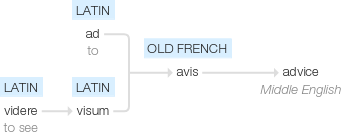Advice
Middle English: from Old French avis, based on Latin ad ‘to’ + visum, past participle of videre ‘to see’. The original sense was ‘way of looking at something, judgement’, hence later ‘an opinion given’.
wiktionary
From Middle English avys, from Old French avis, from the phrase ce m'est a vis ("in my view"), where vis is from Latin visus, past participle of videre(“to see”). See vision, and confer avise, advise. The unhistoric -d- was introduced in English 15c. Doublet of aviso.
Displaced native Old English rǣd.
etymonline
advice (n.)
late 13c., auys "opinion," from Old French avis "opinion, view, judgment, idea" (13c.), from phrase ço m'est à vis "it seems to me," or from Vulgar Latin *mi est visum "in my view," ultimately from Latin visum, neuter past participle of videre "to see" (from PIE root *weid- "to see"). Meaning "opinion offered as worthy to be followed, counsel" is from late 14c.
The unetymological -d- (on model of Latin words in ad-) was inserted occasionally in French by scribes 14c.-16c. and was made regular in English 15c. by Caxton. Substitution of -c- for -s- is 18c., to preserve the breath sound and to distinguish from advise. Early Modern English tended to alternate -ce and -se endings in otherwise confusable noun-verb pairs, using -se for the verb and -ce for the noun: devise/device, peace/appease, practice/practise, license/licence, prophecy/prophesy.
